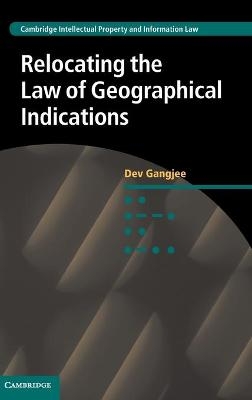
Relocating the Law of Geographical Indications
Seiten
2012
Cambridge University Press (Verlag)
978-0-521-19202-6 (ISBN)
Cambridge University Press (Verlag)
978-0-521-19202-6 (ISBN)
There is huge variation in the nature, scope and institutional forms of legal protection for valuable geographical brands such as Champagne, Colombian coffee and Darjeeling tea. Adopting a historical approach, Dev Gangjee investigates the extent to which these brands are protected by international intellectual property law.
There is considerable variation in the nature, scope and institutional forms of legal protection for valuable geographical brands such as Champagne, Colombian coffee and Darjeeling tea. While regional products are increasingly important for producers, consumers and policy makers, the international legal regime under the TRIPS Agreement remains unclear. Adopting a historical approach, Dev Gangjee explores the rules regulating these valuable geographical designations within international intellectual property law. He traces the emergence of geographical indications as a distinct category while investigating the key distinguishing feature of the link between regional products and their places of origin. The research addresses long-standing puzzles, such as the multiplicity of regimes operating in this area; the recognition of the link between product and place and its current articulation in the TRIPS definition; the varying scope of protection; and the extent to which geographical indications ought to be treated as a category distinct from trade marks.
There is considerable variation in the nature, scope and institutional forms of legal protection for valuable geographical brands such as Champagne, Colombian coffee and Darjeeling tea. While regional products are increasingly important for producers, consumers and policy makers, the international legal regime under the TRIPS Agreement remains unclear. Adopting a historical approach, Dev Gangjee explores the rules regulating these valuable geographical designations within international intellectual property law. He traces the emergence of geographical indications as a distinct category while investigating the key distinguishing feature of the link between regional products and their places of origin. The research addresses long-standing puzzles, such as the multiplicity of regimes operating in this area; the recognition of the link between product and place and its current articulation in the TRIPS definition; the varying scope of protection; and the extent to which geographical indications ought to be treated as a category distinct from trade marks.
Dev Gangjee is a lecturer in intellectual property at the Department of Law, London School of Economics and Political Science. He is also a research fellow at the Oxford Intellectual Property Research Centre, a research affiliate at IP Osgoode, Osgoode Hall Law School, York University, Toronto, and a visiting professor at Munich Intellectual Property Law Centre.
1. Introduction: locating geographical indications; Part I: 2. The indication of source: Paris and Madrid; 3. The appellation of origin in France; 4. The appellation of origin in the Lisbon Agreement; Part II: 5. TRIPS today; 6. TRIPS tomorrow?; 7. Conclusions: relocating geographical indications.
| Erscheint lt. Verlag | 23.2.2012 |
|---|---|
| Reihe/Serie | Cambridge Intellectual Property and Information Law |
| Verlagsort | Cambridge |
| Sprache | englisch |
| Maße | 158 x 234 mm |
| Gewicht | 700 g |
| Themenwelt | Recht / Steuern ► EU / Internationales Recht |
| Recht / Steuern ► Wirtschaftsrecht ► Urheberrecht | |
| ISBN-10 | 0-521-19202-1 / 0521192021 |
| ISBN-13 | 978-0-521-19202-6 / 9780521192026 |
| Zustand | Neuware |
| Haben Sie eine Frage zum Produkt? |
Mehr entdecken
aus dem Bereich
aus dem Bereich
Gesetz gegen den unlauteren Wettbewerb, Preisangabenverordnung, …
Buch | Softcover (2024)
dtv Verlagsgesellschaft
16,90 €
Textausgabe zum deutschen, europäischen und internationalen Patent-, …
Buch | Softcover (2023)
dtv Verlagsgesellschaft
17,90 €


